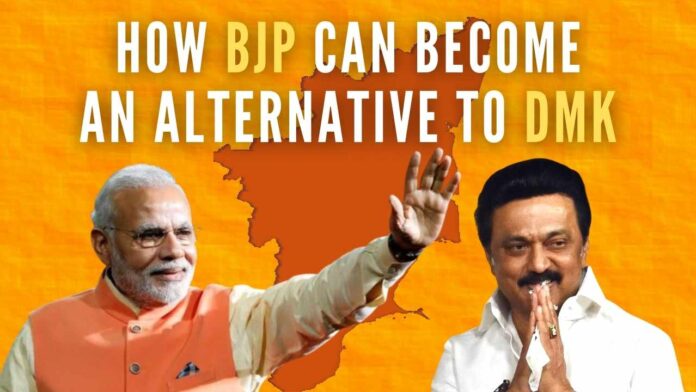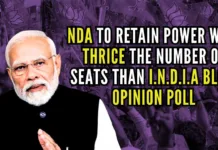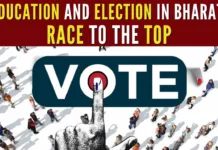
BJP should gain strong ground in Tamil Nadu
This is an article on the strategy shift I believe BJP should make to become the alternative to DMK in Tamil Nadu.
As I had already written in a previous article titled: “Time To End Monopoly Power Of Families In Politics”[1], in which I had referenced many family-owned parties, DMK is a proprietary family business that has looted Tamil Nadu (and even the nation through its representation in the Central government) in humongous proportions for over 50 years. The proprietor, a glib talker who got lucky to be at the right place and right time, has passed away in recent years, and the business ownership has now got passed on to his son and other family descendants.
Though AIADMK was an offshoot of DMK and inherited its corrupt ways from its DMK DNA, it is not a family-owned party and had two charismatic leaders, MGR and Ms. J Jayalalithaa, who were somewhat more responsible and responsive leaders. After their demise, the party is an intestate property waiting to be gobbled up by a few second-rung leaders, with EPS (Edappadi Palanisamy) being ahead in the race. It is doubtful if he will ever become elected CM, though.
This leaves the people with a difficult choice during elections. Previously, they used to elect DMK Alliance (including Congress as a junior partner) and AIADMK Alliance (including BJP as a junior partner) almost alternately.
In future elections, people have to choose between the DMK Alliance with about 25% committed cadres’ vote share as the main party, and the AIADMK Alliance with a lower percentage of committed cadre vote share as the alternative. Typically, the committed voters in Tamil Nadu are hard to convert.
A large percentage of the rest of the uncommitted voters whose votes are critical to winning any elections are likely to vote for the party they perceive as winnable. They generally decide who they don’t want to vote for. There are a few other parties, with less than 5% cadre vote share each, in the ring, vying for their votes too. Seeman’s NTK, and Kamala Haasan’s MNM, are the main ones.
There is a strong antipathy towards BJP in Tamil Nadu, being perceived as a Hindi-imposing, Aryan party trying to gain roots in the ‘Dravidian heartland’. These perceptions were created and perfected by DMK over decades and reinforced by the other parties, and so these perceptions have come to stick.
So, for BJP to gain 35-40% vote share and become the largest party, or even to gain 25% vote share and come second, either alone or as part of an alliance, against DMK, AIADMK, and the other parties, appear a daunting, if not impossible, task.
But in the interest of Tamil Nadu and the nation, BJP should gain strong ground. BJP central leadership has been working relentlessly on this.
The best thing BJP has done in this direction is appointing Annamalai as the party President. He’s one of the most competent spokespersons across all parties and across India, with a humble, rural Tamil background, ex-IPS officer with excellent academic and professional credentials, perceived as very honest in the cesspool of politics, speaks in Tamil very fluently, approachable, accepted by even seniors despite being a junior in the party, and so on.
Though BJP is doing many things right to gain vote share in Tamil Nadu, I strongly believe it needs the right strategy and a fundamental course correction.
To start with, Tamil Nadu BJP has been attacking DMK leadership quite well and on solid grounds, which is fine in the sense it is trying to occupy the role of the main opposition party in Tamil Nadu.
But BJP should set its sights on the 2024 Lok Sabha elections first. State elections are 4 years away. BJP will find it difficult to attack DMK and gain any significant vote share in the near term, contesting alone or in alliance with AIADMK. People won’t change their attitude to DMK and BJP easily.
People vote for UPA in the Lok Sabha elections only because of the presence of DMK. In the Lok Sabha elections, the weakest link is the Congress (in the UPA alliance). DMK is not in contention for the PM’s post anyway.
Hence, I think instead of focusing on DMK as its adversary, I think Tamil Nadu BJP, esp Annamalai, should focus on attacking Congress and UPA mainly, and also attack the opposition parties across India broadly, exposing them as corrupt, dynastic, and even anti-national. Attacking DMK can be in passing. People will have less reluctance in accepting attacks on Congress and other opposition parties as they have no great affinity with them.
The idea that Modi is the better PM candidate than Rahul Gandhi (or anyone else from UPA, or any combination of opposition parties) will be a more acceptable proposition to Tamils, than BJP as an alternative to DMK. Since we have only about 20 months for the Lok Sabha elections, this may be a good time to start implementing this strategy as people will require some time to understand this proposition, and to accept Modi as the PM they should vote for.
Additionally, I think the following course correction is required; the fact that the Central government is trying to impose Hindi across the country cannot be denied. Not only will it ruin BJP’s chances in the Tamil Nadu elections, but also it’s not the right thing to do, and not in the national interest.
BJP should listen to the genuine apprehensions of Tamils (and people from some other non-Hindi speaking states) about the Central government promoting Hindi as the sole national/ link language. If this were to happen, Tamils would have a distinct disadvantage in educational and job opportunities, to start with; trying to argue otherwise is counter-intuitive.
In fact, if Congress had not tried to impose Hindi in Tamil Nadu in the 1960s, DMK may not have grown as big as it has grown. And Hindi may have become a lot more acceptable in Tamil Nadu, organically; Tamil Nadu may have been following 3 language policy.
We have been managing Hindi and English together as the link language, very well for so long, and we should continue to do so, at least till by a natural organic process, some other solution emerges. Many, including the author, believe that Tamils have benefitted more from their knowledge of English than they would have benefitted from Hindi had they learned it. Trying to argue that the Central government is only trying to give primacy to the state’s own language first is a clever deflection of the issue of national/ link language, but won’t cut ice.
It’s also a fact that the Central government has been posting non-Tamils to even Class 3 and Class 4 jobs in Tamil Nadu, which involves interacting with local Tamils, and also denying job opportunities for Tamils. This is grossly unfair and only antagonizes Tamils to no end. Posting non-locals to Class 1 and Class 2 jobs on an all-India merit basis is understandable, though.
Also, all the sign boards, milestones, etc, across Tamil Nadu should have Tamil and English on top and Hindi at the bottom.
I have dwelt on the language issue here at great length because I want the Central government to understand the sentiments of Tamils. Without doing this, BJP can’t hope to take roots in Tamil Nadu.
BJP should not look at this as a concession for growth in Tamil Nadu; it’s also the right and fair thing to do.
Once BJP gains ground in the Lok Sabha elections, it will be easier to convince the people to vote for BJP even in the state elections.
Note:
1. Text in Blue points to additional data on the topic.
2. The views expressed here are those of the author and do not necessarily represent or reflect the views of PGurus.
Reference:
[1] Time to end monopoly power of families in politics is now – Jul 14, 2022, PGurus.com
PGurus is now on Telegram. Click here to join our channel and stay updated with all the latest news and views
For all the latest updates, download PGurus App.
- How BJP can get 33%+ vote share in TN - April 1, 2024
- A transparent, equitable electoral funding alternative - March 19, 2024
- How TN BJP can come to No. 1 or No. 2 in 2024 LS polls - January 11, 2024











+ “The fact that the Central government is trying to impose Hindi across the country cannot be denied”.
+ “It’s also a fact that the Central government has been posting non-Tamils to even Class 3 and Class 4 jobs in Tamil Nadu”
So, the BJP is married to Hindi hegemony but others can do nothing about it